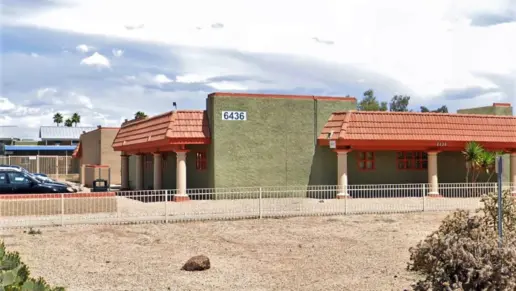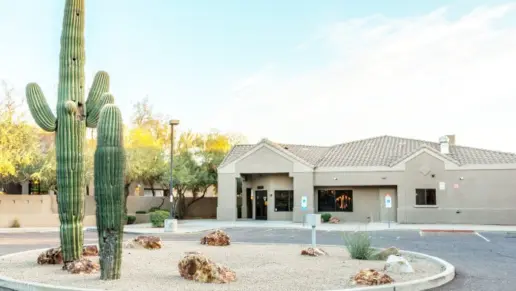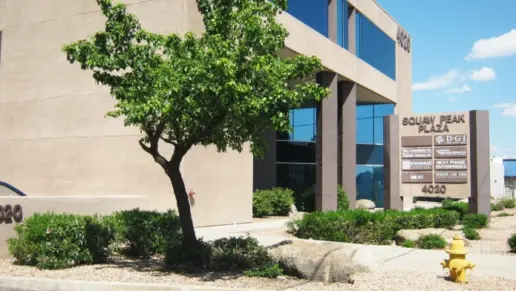About the Facility
Devereux Advanced Behavioral Health – Phoenix Area Respite provides mental and behavioral health services for youth and families in Scottsdale, Arizona. They offer short-term residential care and aftercare support for clients between the ages of 4 and 17 who require significant mental, emotional, and/or behavioral support, including alcohol and drug rehab services.
Their respite care programs enable clients to rest and work on their recovery in a safe, structured, and supportive environment featuring around-the-clock supervision. Inviting, home-like amenities include onsite recreational facilities. Clients may receive overnight, weekend, holiday, and school break respite care. They also engage in age-appropriate, recovery-focused activities to cultivate critical social and emotional skills. Clients may also receive medical and mental health assessments and medication management support to promote their long-term recovery and successful reintegration into their home, school, and community. Respite care is designed to allow caregivers to recuperate and recover from stressful circumstances while they and their children continue to receive the mental and behavioral health care services they need.
Their aftercare services enable a complete continuum of care aligned with clients’ evolving needs. These services may include step-down support for clients entering outpatient care, peer coaching, and referrals for additional medical, mental health, and social service programs.
Devereux Advanced Behavioral Health – Phoenix Area Respite may be able to work with major insurance providers, such as Aetna, Cigna, BlueCross BlueSHield, Humana, United Healthcare, and others, to offset treatment costs. Contact your provider to verify coverage because out of network benefits can vary. Financial assistance is available.
 Accreditations
Accreditations

Joint Commission
The Joint Commission, formerly known as JCAHO, is a nonprofit organization that accredits rehab organizations and programs. Founded in 1951, the Joint Commision's mission is to improve the quality of patient care and demonstrating the quality of patient care.
Joint Commission Accreditation: Yes
 Treatment
Treatment
 Mental Health
Mental Health
Treatment for addiction includes mental health services that are provided while during your stay at the facility. This may be a hospital, clinic, or a luxury treatment center setting. You receive 24-hour support and monitoring by mental health counselors and clinical staff. Most inpatient programs last 30 days, but some can last for two months or longer. Mental health is addressed during treatment via group and individual counseling, addiction education programming, and often recreational activities.
 Insurance and Financial
Insurance and Financial
Daily
Self-pay options
Private insurance
Medicaid
Financial aid
 Programs
Programs
-
Adolescence program
-
LGBTQ program
-
Program for men
-
Program for women
-
Total beds
 Levels of Care
Levels of Care
 24-Hour Clinical Care
24-Hour Clinical Care
At certain points in the recovery process, it’s important to have support available 24/7. 24-hour clinical care offers a safe environment in which to recover from drug or alcohol addiction in peace, knowing medical detox and other treatment will happen with professionals on hand.
 Inpatient
Inpatient
Residential treatment programs are those that offer housing and meals in addition to substance abuse treatment. Rehab facilities that offer residential treatment allow patients to focus solely on recovery, in an environment totally separate from their lives. Some rehab centers specialize in short-term residential treatment (a few days to a week or two), while others solely provide treatment on a long-term basis (several weeks to months). Some offer both, and tailor treatment to the patient's individual requirements.
 12-Step
12-Step
Many addiction recovery centers base their treatment modalities on the 12 step program model and those in treatment often transition to community-based programs. These programs can also be effective for clients who choose not to enter rehab. 12 step meetings are designed to provide intensive peer support whenever it is needed. In addition to group meetings and peer sponsorship, participants “work the steps” to achieve recovery through a systematic healing of the mind, body, and spirit.
 Aftercare Support
Aftercare Support
Completing a drug or alcohol rehab program shouldn't spell the end of substance abuse treatment. Aftercare involves making a sustainable plan for recovery, including ongoing support. This can include sober living arrangements like halfway houses, career counseling, and setting a patient up with community programs like Alcoholics Anonymous (AA) or Narcotics Anonymous (NA).
 Clinical Services
Clinical Services
Animal Therapy
Animal therapy (aka pet therapy or animal-assisted therapy) can be very healing, as it allows patients to bond with animals, who give unconditional love. This is particularly useful for those who suffered trauma by the hands of people, who may be able to trust and form closer attachments to animals than humans at certain stages of rehabilitation.
Cognitive Behavioral Therapy
Cognitive Behavioral Therapy (CBT) is a therapy modality that focuses on the relationship between one's thoughts, feelings, and behaviors. It is used to establish and allow for healthy responses to thoughts and feelings (instead of unhealthy responses, like using drugs or alcohol). CBT has been proven effective for recovering addicts of all kinds, and is used to strengthen a patient's own self-awareness and ability to self-regulate. CBT allows individuals to monitor their own emotional state, become more adept at communicating with others, and manage stress without needing to engage in substance abuse.
Creative Arts Therapy
Creativity is inherently healing, and can help those in recovery express thoughts or feelings they might not otherwise be able to. Creative arts therapy can include music, poetry/writing, painting, sculpting, dance, theater, sandplay, and more. Unlike traditional art, the final product matters far less than the experience of creation and expression itself.
Dialectical Behavior Therapy
Dialectical Behavior Therapy (DBT) is a modified form of Cognitive Behavioral Therapy (CBT), a treatment designed to help people understand and ultimately affect the relationship between their thoughts, feelings, and behaviors. DBT is often used for individuals who struggle with self-harm behaviors, such as self-mutilation (cutting) and suicidal thoughts, urges, or attempts. It has been proven clinically effective for those who struggle with out-of-control emotions and mental health illnesses like Borderline Personality Disorder.
Experiential Therapy
Experiential therapy is a form of therapy in which clients are encouraged to surface and work through subconscious issues by engaging in real-time experiences. Youth use daily life situations to gain insight into developing social, life and coping skills that are taught through curriculum based groups and programming activities such as (but not limited to) bullying prevention, communication, self-respect, responsibility, creative problem solving, conflict resolution and social responsibility.
Family Therapy
Their Family-based Respite Program takes place in the homes of Devereux licensed respite providers. Respite is provided to children through the age of 17. Children are matched with providers who can best meet their individual needs. Family-based respite can be available 24/7.
Group Therapy
Group therapy is any therapeutic work that happens in a group (not one-on-one). There are a number of different group therapy modalities, including support groups, experiential therapy, psycho-education, and more. Group therapy involves treatment as well as processing interaction between group members.
Individual Therapy
In individual therapy, a patient meets one-on-one with a trained psychologist or counselor. Therapy is a pivotal part of effective substance abuse treatment, as it often covers root causes of addiction, including challenges faced by the patient in their social, family, and work/school life.
Life Skills
Life skills trainings involve all the skills a person must have in order to function successfully in the world. These include time management, career guidance, money management, and effective communication. Truly successful addiction recovery is based on the ability to not only live substance-free, but to thrive. Life skills teaches the practical necessities of functioning in society, which sets clients up for success in life, and therefore sobriety.
 Settings and Amenities
Settings and Amenities
-
Residential setting
-
Private setting
-
Recreation room
-
Art activities
 Contact
Contact
6439 East Eugie Terrace
Scottsdale AZ, 85254


